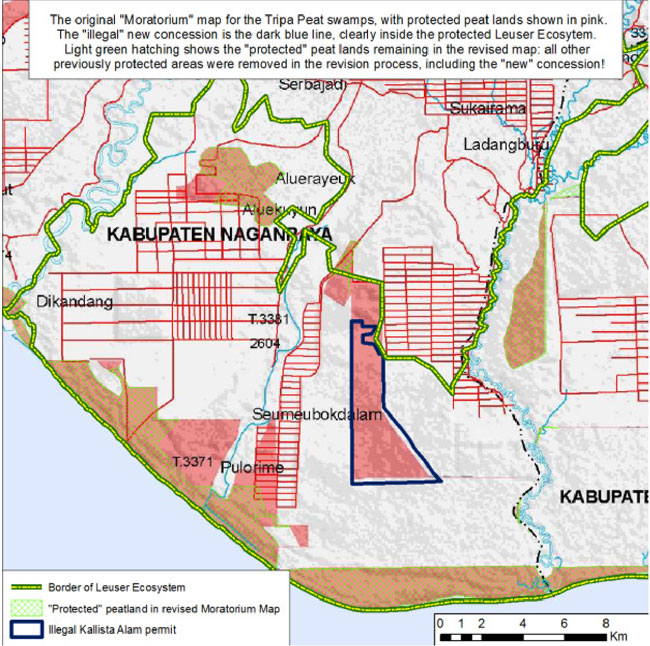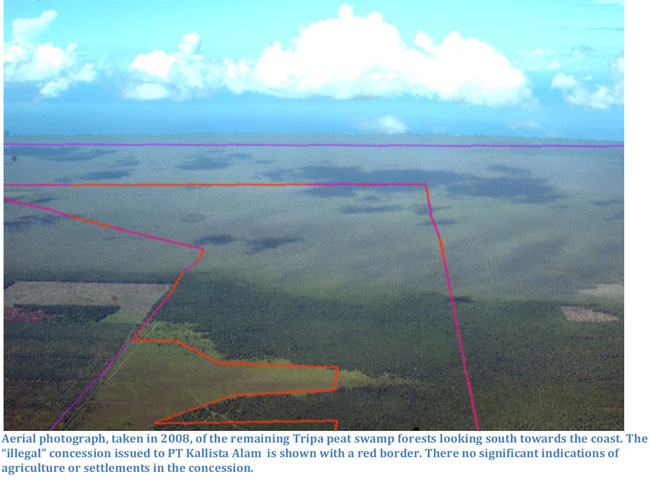Fires Rage in Sumatra as Tripa Swamp Burns Prime Orangutan Habitat

Fires Rage in Sumatra as Tripa Swamp Burns Prime Orangutan Habitat
Environmental grassroots network, Friends of the Earth Indonesia are taking the Aceh Governor and large palm oil company (PT, Kallista Alam) to court for illegally approving the destruction of Tripa, an area of Peat Forests known to have the highest densities of Sumatran orangutans in the world. Tripa is one of only six remaining populations for the Critically Endangered Sumatran orangutan (Pongo abelii) and one of the UNEP-GRASP priority sites for the species. It currently hosts around 280 Sumatran orangutans, accounting for more than 4% of the remaining world population. Tripa also has amongst the highest densities of orangutans anywhere in the world, which has facilitated a unique culture of tool use.
The Orangutan Project (formally known as The Australian Orangutan Project, www.orangutan.org.au) provides direct funding to help support the work involved with the conservation of the Tripa swamps. The extensive list of costs involved includes items such as equipment (camera, GPS, etc), transport costs, postage, Indonesian staff wages and conference fees.
Leif Cocks, President of The Orangutan Project that financially supports the local community's fights to save the ecosystem says, 'Without immediate action we are seeing the death throes of Tripa and the hundred of orangutans that need the peat-land for survival. The palm oil companies are on a mission to destroy as much of the remaining forest that they can and as fast as they possibly can, ignoring the effect on the local communities that rely on the ecosystem for their health and livelihood. The orangutan population will be totally slaughtered if the current destruction is not stopped. Orangutans are dying en masse as we speak."
In May, 2010 Indonesia and Norway signed a Letter of Intent, in which Indonesia stated its intent to reduce emissions from forest and peat-land conversions, including a 2-year moratorium on new concessions for converting peat-lands and natural forests, while Norway would provide $1 billion to assist Indonesia with establishing REDD projects.
 The 2-year moratorium was established through Presidential Instruction 10/2011, and the first revision of the 'Moratorium on New Permits" Map was issued by the Indonesian Minister of Forestry at the end of November, 2011. The map shows the areas of primary forest (in green) and peat lands (in pink) that are effectively off limits and protected from any new exploitation permits.
The 2-year moratorium was established through Presidential Instruction 10/2011, and the first revision of the 'Moratorium on New Permits" Map was issued by the Indonesian Minister of Forestry at the end of November, 2011. The map shows the areas of primary forest (in green) and peat lands (in pink) that are effectively off limits and protected from any new exploitation permits.
In the new revised version of the map, an area in the Tripa peat swamps on the west coast of Aceh, shown as protected peat land in the first edition of the map issued in May, had been mysteriously removed from the areas under protection (see map).
Coincidentally, just a few days earlier, the Aceh branch of WALHI/Friends of the Earth Indonesia had launched a court case in Aceh against the Governor of Aceh and oil palm company PT Kallista Alam, requesting the cancelling of the Governor's permit issued to Kallista Alam, to convert this very same area of forest on deep peat land to an oil palm plantation. The permit was issued on the 25th of August, 2011; three months AFTER the first edition of the map clearly outlined the area as protected and off limits to any new exploitation permits.
 The illegal concession was a major issue for the Indonesian delegation at the UNCCC in Durban, South Africa, with Kuntoro Mangkusubroto, the head of the President's own special task force of reducing carbon emissions, explaining: "While we recognise the need for the palm oil industry to also grow, signing an agreement with a palm oil company to allow the conversion of protected peat-land into palm oil plantations, very clearly breaks the moratorium."
The illegal concession was a major issue for the Indonesian delegation at the UNCCC in Durban, South Africa, with Kuntoro Mangkusubroto, the head of the President's own special task force of reducing carbon emissions, explaining: "While we recognise the need for the palm oil industry to also grow, signing an agreement with a palm oil company to allow the conversion of protected peat-land into palm oil plantations, very clearly breaks the moratorium."
Today, as the legal action brought by WALHI/Friends of the Earth Indonesia against the Governor and PT Kallista Alam comes to a climax, with the judge's ruling expected on 3rd April, there is no evidence that any investigation has been carried out.
The long term environmental impacts, particularly drought and flooding, for local communities that have already lost most of their traditional livelihoods, will be irreversible, with the area ultimately becoming unusable due to coastal erosion and saltwater intrusion, even for the oil palm companies. All at the cost of huge carbon emissions from the degraded peat.
 A win in this case will represent a major turning point for the long term protection of the Leuser Ecosystem, probably the single most important protected ecosystem in South East Asia, and send a strong message towards improving environmental governance in Indonesia.
A win in this case will represent a major turning point for the long term protection of the Leuser Ecosystem, probably the single most important protected ecosystem in South East Asia, and send a strong message towards improving environmental governance in Indonesia.
Please view the following video on the Tripa Swamp ecosystem: YouTube
For continuously updated news and photos see www.Facebook.com/savetripa
The Orangutan Project (formally known as The Australian Orangutan Project, www.orangutan.org.au) provides direct funding to help support the work involved with the conservation of the Tripa swamps. The extensive list of costs involved includes items such as equipment (camera, GPS, etc), transport costs, postage, Indonesian staff wages and conference fees.
Leif Cocks, President of The Orangutan Project that financially supports the local community's fights to save the ecosystem says, 'Without immediate action we are seeing the death throes of Tripa and the hundred of orangutans that need the peat-land for survival. The palm oil companies are on a mission to destroy as much of the remaining forest that they can and as fast as they possibly can, ignoring the effect on the local communities that rely on the ecosystem for their health and livelihood. The orangutan population will be totally slaughtered if the current destruction is not stopped. Orangutans are dying en masse as we speak."
In May, 2010 Indonesia and Norway signed a Letter of Intent, in which Indonesia stated its intent to reduce emissions from forest and peat-land conversions, including a 2-year moratorium on new concessions for converting peat-lands and natural forests, while Norway would provide $1 billion to assist Indonesia with establishing REDD projects.
 The 2-year moratorium was established through Presidential Instruction 10/2011, and the first revision of the 'Moratorium on New Permits" Map was issued by the Indonesian Minister of Forestry at the end of November, 2011. The map shows the areas of primary forest (in green) and peat lands (in pink) that are effectively off limits and protected from any new exploitation permits.
The 2-year moratorium was established through Presidential Instruction 10/2011, and the first revision of the 'Moratorium on New Permits" Map was issued by the Indonesian Minister of Forestry at the end of November, 2011. The map shows the areas of primary forest (in green) and peat lands (in pink) that are effectively off limits and protected from any new exploitation permits. In the new revised version of the map, an area in the Tripa peat swamps on the west coast of Aceh, shown as protected peat land in the first edition of the map issued in May, had been mysteriously removed from the areas under protection (see map).
Coincidentally, just a few days earlier, the Aceh branch of WALHI/Friends of the Earth Indonesia had launched a court case in Aceh against the Governor of Aceh and oil palm company PT Kallista Alam, requesting the cancelling of the Governor's permit issued to Kallista Alam, to convert this very same area of forest on deep peat land to an oil palm plantation. The permit was issued on the 25th of August, 2011; three months AFTER the first edition of the map clearly outlined the area as protected and off limits to any new exploitation permits.
 The illegal concession was a major issue for the Indonesian delegation at the UNCCC in Durban, South Africa, with Kuntoro Mangkusubroto, the head of the President's own special task force of reducing carbon emissions, explaining: "While we recognise the need for the palm oil industry to also grow, signing an agreement with a palm oil company to allow the conversion of protected peat-land into palm oil plantations, very clearly breaks the moratorium."
The illegal concession was a major issue for the Indonesian delegation at the UNCCC in Durban, South Africa, with Kuntoro Mangkusubroto, the head of the President's own special task force of reducing carbon emissions, explaining: "While we recognise the need for the palm oil industry to also grow, signing an agreement with a palm oil company to allow the conversion of protected peat-land into palm oil plantations, very clearly breaks the moratorium." Today, as the legal action brought by WALHI/Friends of the Earth Indonesia against the Governor and PT Kallista Alam comes to a climax, with the judge's ruling expected on 3rd April, there is no evidence that any investigation has been carried out.
The long term environmental impacts, particularly drought and flooding, for local communities that have already lost most of their traditional livelihoods, will be irreversible, with the area ultimately becoming unusable due to coastal erosion and saltwater intrusion, even for the oil palm companies. All at the cost of huge carbon emissions from the degraded peat.
 A win in this case will represent a major turning point for the long term protection of the Leuser Ecosystem, probably the single most important protected ecosystem in South East Asia, and send a strong message towards improving environmental governance in Indonesia.
A win in this case will represent a major turning point for the long term protection of the Leuser Ecosystem, probably the single most important protected ecosystem in South East Asia, and send a strong message towards improving environmental governance in Indonesia. Please view the following video on the Tripa Swamp ecosystem: YouTube
For continuously updated news and photos see www.Facebook.com/savetripa
MORE





